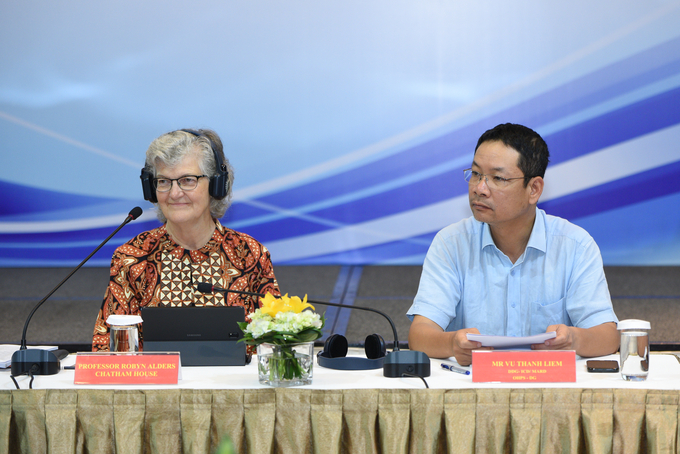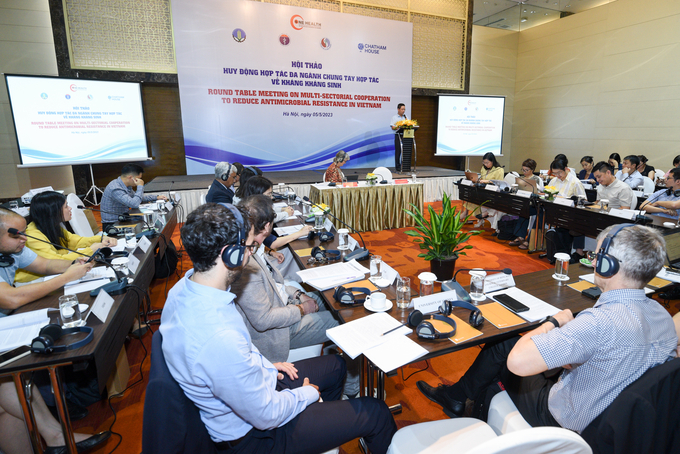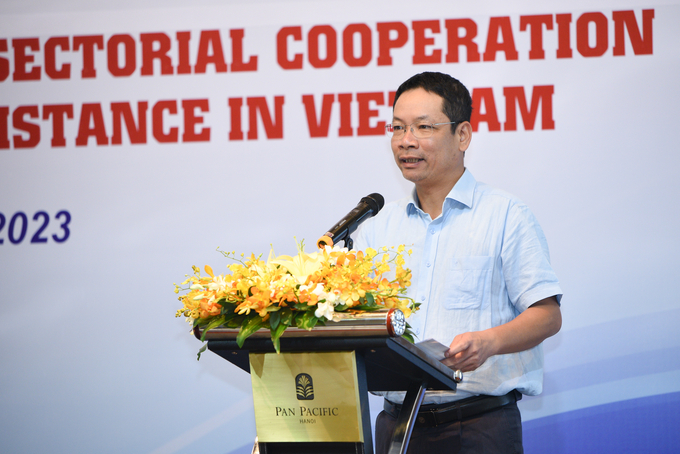November 26, 2025 | 06:07 GMT +7
November 26, 2025 | 06:07 GMT +7
Hotline: 0913.378.918
November 26, 2025 | 06:07 GMT +7
Hotline: 0913.378.918

Deputy Director of the International Cooperation Department Vu Thanh Liem and Professor Robyn Alders of Chatham House co-chaired the Round Table Meeting. Photo: Tung Dinh.
The Round Table Meeting on Multi-Sectoral Cooperation to Reduce Antimicrobial Resistance in Vietnam was organized by the Ministry of Agriculture and Rural Development in collaboration with the UK-based organization Chatham House.
Antimicrobial resistance is a pressing issue within the framework of the One Health Partnership for the prevention of zoonotic diseases as specified under task 3 in the Partnership Framework. The Round Table Meeting was organized in a timely manner to strengthen multi-sectoral and multi-partner cooperation in the fight against antimicrobial resistance in Vietnam.
Vietnam has been recognized as the first country in the Western Pacific region to develop a National Action Plan on antimicrobial resistance (AMR) for the years between 2013 and 2020. The National Action Plan was approved by the Ministry of Health under Decision No. 2174 dated June 21, 2013.
The "National Action Plan on management of antimicrobial use and prevention of antimicrobial resistance in livestock and aquaculture" was issued in 2017. However, Vietnam continues to have one of the highest AMR rates in Asia despite the deployment of an action plan to combat antimicrobial resistance.
Subsequently, the Ministry of Agriculture and Rural Development issued Decision No. 3609 dated August 23, 2021 approving the National Action Plan on antimicrobial resistance control in the agricultural sector from 2021 to 2025. Accordingly, the Department of Animal Health is the technical focal point.
Vietnam's National Action Plan on Antimicrobial Resistance in Health and Agriculture highlights the five major objectives under the global action plan as well as FAO's action plan for 2021-2025. This action plan has outlined several detailed tasks that correspond with the conditions and circumstances of Vietnam.

The Round Table Meeting on Multi-Sectoral Cooperation to Reduce Antimicrobial Resistance in Vietnam was held on the morning of May 5. Photo: Tung Dinh.
According to Mr. Vu Thanh Liem, Deputy Director of the International Cooperation Department under the Ministry of Agriculture and Rural Development, the Round Table Meeting was organized with the support of Chatham House, UK due to limited domestic resources. The Meeting calls for the unanimous cooperation between Vietnam's ministries and international development partners in the fight against antimicrobial resistance in Vietnam; thereby, creating opportunities to share responsibility, propose policies and institutions on antimicrobial resistance.
In addition, the Meeting aims to propose a multi-sectoral coordination mechanism on antimicrobial resistance; mobilize domestic and international resources for the prevention of antimicrobial resistance; mobilize resources to implement the commitments and tasks under the National Action Plan on antimicrobial resistance in health and agriculture.
The meeting highlighted several shortcomings in terms of Vietnam's regulations on the supply of antimicrobial in public health and veterinary medicine; supply of medical and veterinary antibiotics; antimicrobial use surveillance system.
"This National Action Plan requires an enhanced multi-sectoral cooperation in the prevention and control of antimicrobial resistance. This cooperation should be developed based on the One Health approach because humans, animals, plants and the environment are interconnected at global, regional, national, and sectoral levels," said Mr. Vu Thanh Liem.

Mr. Vu Thanh Liem, Deputy Director of the Department of International Cooperation giving a speech at the Meeting. Photo: Tung Dinh.
The Round Table Meeting calls for strengthened domestic and international cooperation in the field of antimicrobial resistance within the framework of the One Health Partnership for the prevention of zoonotic diseases. The influence and impact of antimicrobial resistance is well-documented through the presentations from leading technical agencies, namely the Department of Medical Service Administration and the Department of Animal Health.
"Regarding the One Health Partnership Framework, we strive to create mechanisms and forums for specialists to share research results, lessons, and practical experiences on national and international antimicrobial resistance programs. Additionally, we have to act as a bridge to connect domestic stakeholders with international development partners. Major partners from the UK, the US, the EU, Australia, and France are present at this Round Table Meeting to assess the needs from Vietnam's governmental agencies. Consequently, we will have a basis for cooperation and technical support as well as arrange resources that correspond with the conditions and circumstances of Vietnam," said Mr. Vu Thanh Liem.
Translated by Nguyen Hai Long
/2025/11/24/3536-2-112800_176.jpg)
(VAN) Dong Nai now has tens of thousands of hectares of forests certified for sustainable management, and this area will continue to be expanded in the coming period.

(VAN) Vinh Ha hamlet (Dai Xuyen commune, Hanoi) is shifting away from small-scale farming as households adopt bioscurity into their breeder chicken models.

(VAN) Heavy rains make aquatic species more vulnerable to disease. Proactive water management and high-tech systems help farmers prevent outbreaks and protect yields.

(VAN) Greenhouses are shifting production mindsets in Binh Lu commune, enabling farmers to ‘weather the sun and rain’ and secure stable vegetable harvests throughout the year.

(VAN) Green transition is crucial for the Mekong Delta amid climate change and stricter standards, offering a path toward sustainability.

(VAN) Dong Thap promotes agricultural restructuring, forms large specialized farming zones, raises the value of agricultural products and develops toward ecological and high-tech directions.
/2025/11/22/4018-4-213342_747.jpg)
(VAN) The Mekong Delta Agricultural Experts Club has attracted 143 experts and researchers to participate in providing consultancy and contributing initiatives to the development of one million hectares of high-quality rice.